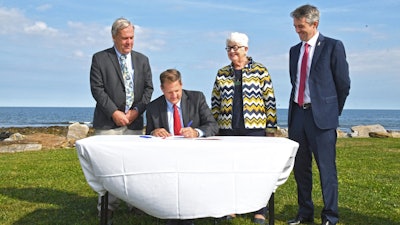
CONCORD, N.H. (AP) — New Hampshire's governor signed a ban on oil and gas drilling in the state's coastal waters on Tuesday, a move that several states have taken in response to the Trump administration's proposal to open new areas for exploration.
While Republican Gov. Chris Sununu said the Trump administration has assured him that drilling would not occur off New Hampshire's 18-mile-long (30-kilometer-long) coast, he said the legislation was important to protect the waters for future generations.
"New Hampshire has a long and proud tradition of environmental stewardship, and today's action to ban oil and gas drilling off of our pristine coastline is another step in the right direction," Sununu said in a statement.
Governors and lawmakers from both Republican- and Democratic-led states have fought the administration's plans for expanded offshore drilling. A federal judge ruled in May that President Donald Trump had exceeded his authority when he ordered that the Arctic and parts of the Atlantic be opened to oil and gas development.
The American Petroleum Institute has opposed the state bans, saying closing the door to offshore development could hurt local economies as well as the nation's energy security.
The bill Sununu signed at a seaside state park was sponsored by Democrats and takes effect later this year. State Sen. Martha Fuller Clark, D-Portsmouth, called it a victory for the environment and the state.
"With our coastline protected, now it is time for New Hampshire to move forward on sustainable energy developments, including offshore wind and solar," she said in a statement.
New Jersey passed its prohibition in 2018, while bills were signed into law in Maine, Oregon and New York earlier this year. In Oregon, the measure extended a temporary 10-year ban that was set to expire next year and directed state agencies to refuse to assist with any potential drilling operations in federal waters off the Oregon coast.
In Rhode Island, bills in both the House and Senate failed to advance past committee in 2018. State Sen. Dawn Euer, a Democrat who sponsored the Senate version, said Tuesday she ran out of time this year to rework her bill to address concerns about unintended consequences but plans to introduce new legislation next year.





















